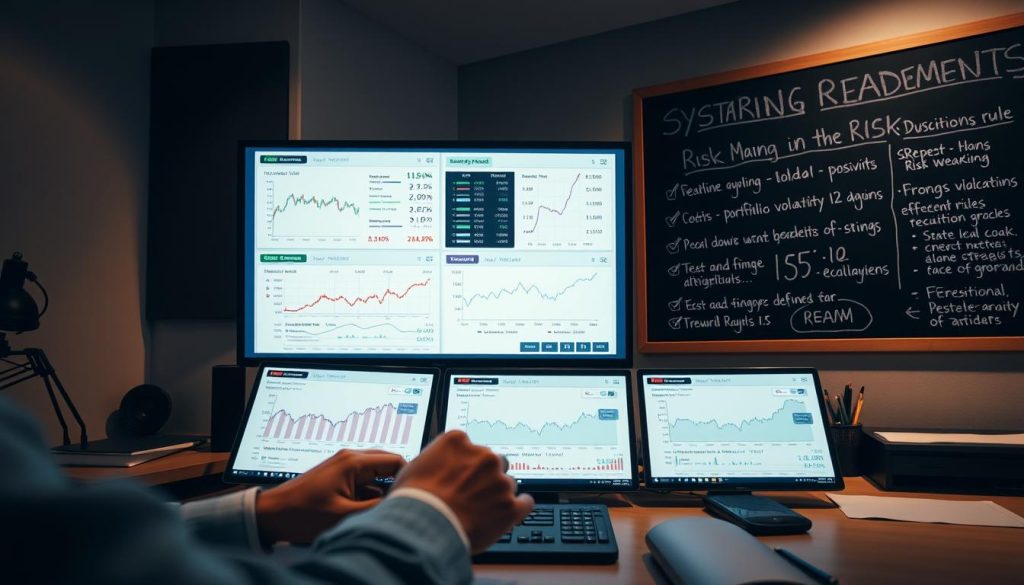How to Manage Psychological Stress During Prop Firm Evaluations

Prop firm evaluations are key moments for traders to show their skills and get trading jobs. The stress of these evaluations can really affect how well a trader does. It’s important to know how to handle stress to succeed.
Traders face big challenges that test their emotional strength and smart thinking. The pressure of these evaluations is high. It’s where mental toughness really matters. Stress can mess up even the best trading plans, making it key to stay calm.
Traders need a complete plan to deal with the stress of these evaluations. They must build strong mental tools to handle the tough scrutiny and high expectations of prop firm evaluations.
Key Takeaways
- Psychological stress significantly impacts trading performance
- Mental resilience is crucial during prop firm evaluations
- Developing emotional control strategies enhances trading potential
- Understanding stress triggers helps improve decision-making
- Proactive stress management techniques can boost trader confidence
Understanding Prop Firm Evaluation Challenges
Prop firm evaluations are key moments for traders. They test not just skills but also mental strength. This is under intense pressure.
Traders face big psychological hurdles in these evaluations. These can greatly affect their trading decisions. It’s vital to understand these challenges to handle the emotional side of trading assessments.
Common Psychological Barriers in Trading
- Fear of failure and potential account rejection
- Overwhelming performance anxiety
- Perfectionist tendencies disrupting rational analysis
- Imposter syndrome affecting confidence
Impact of Evaluation Pressure on Decision Making
Evaluation pressure can change rational traders into emotionally reactive ones. The high stakes create a stressful environment. Traders might:
- Overanalyze market signals
- Make impulsive trading decisions
- Deviate from established trading strategies
“In trading, your greatest competition is not the market, but your own psychological limitations.” – Professional Trading Mentor
Identifying Stress Triggers During Evaluations
| Stress Trigger | Potential Psychological Impact |
|---|---|
| Drawdown Limits | Increased risk aversion |
| Performance Metrics | Heightened anxiety |
| Time Constraints | Rushed decision making |
Knowing these psychological dynamics helps traders manage evaluation challenges better.
Preparing Your Trading Psychology Toolkit
Building a strong trading psychology toolkit is key for success in prop firms. It’s not just about technical skills. It’s also about managing emotions and staying mentally tough.
Traders need to know that their mind affects their decisions. A good toolkit includes:
- Emotional self-regulation techniques
- Cognitive reframing strategies
- Stress management protocols
- Performance visualization exercises
“Success in trading is 10% strategy and 90% psychological preparation.” – Professional Trading Mentor
To prepare mentally for trading, create strategies that fit your personal needs. You can build your toolkit by:
- Daily meditation practices
- Journaling trading emotions
- Developing pre-trading mental checklists
- Implementing structured emotional recovery techniques
Staying mentally sharp needs regular practice and knowing yourself. Traders must keep improving their toolkit to do well under pressure.
| Psychological Skill | Key Focus Area | Implementation Strategy |
|---|---|---|
| Emotional Control | Impulse Management | Breathing exercises, mindfulness techniques |
| Cognitive Flexibility | Adaptive Thinking | Regular mental scenario planning |
| Stress Resilience | Performance Under Pressure | Systematic desensitization training |
Remember, a well-developed trading psychology toolkit transforms psychological challenges into strategic advantages.
Creating a Structured Pre-Evaluation Routine
Successful prop firm traders know that getting ready is crucial for the tough evaluation process. A good pre-trading routine boosts your mental state and trading skills.

Creating a detailed pre-trading routine involves several key steps. These steps help get you mentally and physically ready.
Morning Preparation Techniques
Your routine should start early, before the market opens. Try these morning tips:
- Do 15 minutes of meditation to clear your mind
- Do some light exercise to increase energy
- Look over your trading plan and goals for the day
- Do positive visualization exercises
Setting Up Your Trading Environment
Having the right trading environment is key to staying focused and calm during evaluations.
“A well-organized workspace is the foundation of trading success.” – Professional Trader
- Find a quiet, distraction-free spot
- Make sure your chair and lighting are good
- Use two monitors for better market tracking
- Keep water and healthy snacks close
Mental Preparation Checklist
Your mental prep checklist should focus on being mentally ready and in control:
- Look back at your recent trading objectively
- Clear your emotions from past trading
- Check your risk management plans
- Practice deep breathing
- Remind yourself of your trading strategy and discipline
By sticking to these pre-trading strategies, traders can face prop firm evaluations with more confidence and clarity.
How to Manage Psychological Stress During Prop Firm Evaluations
Trading under pressure during prop firm evaluations can be tough on your mind. Successful traders know that managing stress is key to staying sharp and making smart choices.
Starting to handle stress well means knowing what triggers it for you. Traders often feel a lot of mental pressure during these times. This can make it hard to think clearly and affect their trading plans.
“Mastering your mind is the first step to mastering the markets.” – Professional Trading Mentor
- Identify personal stress signals
- Develop targeted mental resilience strategies
- Create a structured emotional management plan
Some important ways to manage stress include:
- Mindful breathing exercises to calm your mind
- Practices to control your emotions
- Keeping your trading area peaceful
Professional traders suggest a detailed plan to handle mental stress. This plan helps turn stress into energy that boosts your decision-making during evaluations.
Remember, success in trading isn’t just about knowing the technical stuff. It’s also about keeping your emotions in check, even when things get tough.
Implementing Effective Risk Management Strategies
Trading well means managing risk smartly. Prop firms check if traders keep their capital safe and perform well. Knowing how to manage risk can make trading less stressful.

Good risk management starts with knowing how much to risk and how much you can handle. Traders need a plan to handle losses and make the most of wins.
Position Sizing During Evaluation Phase
Position sizing is key in managing risk. Traders should follow these important rules:
- Keep each trade’s risk at 1-2% of your total capital
- Figure out your position size based on your stop loss
- Always risk the same amount per trade
Stop Loss Discipline
“The key to successful trading is not just knowing when to enter, but knowing exactly when to exit.” – Professional Trader
Stop loss strategies help avoid big losses. To use stop loss well, you need:
- Set exit points before you start a trade
- Stay calm, no matter the trade’s outcome
- Always follow your rules
Managing Drawdown Anxiety
Handling drawdowns is key to staying calm during prop firm tests. To reduce stress, try these:
| Strategy | Key Action |
|---|---|
| Performance Tracking | Watch your account’s overall performance, not just single trades |
| Mental Reset | Use deep breathing after tough trades |
| Risk Limitation | Set strict limits on daily losses |
Getting better at risk management takes practice and emotional control. Traders who use a clear plan will likely do better.
Developing Emotional Resilience in Trading

Trading psychology is more than just knowing the markets. It’s about having emotional strength. This strength helps traders stay calm and focused, even when things get tough.
To build emotional resilience, traders need a solid mental training plan. They must create a strong mental foundation. This foundation helps them:
- Stay calm when the market is wild
- Deal with losses without getting upset
- Make smart choices, even when it’s hard
“Resilience is not about never falling, but about rising every time you fall.” – Trading Wisdom
Building mental toughness in trading involves several important steps:
- Cognitive Reframing: Turn bad experiences into chances to learn
- Emotional Regulation: Learn to handle stress and anxiety
- Self-Awareness: Know and control your own emotional triggers
Top traders keep working on their mental game. By building emotional strength, they turn obstacles into chances to grow.
Mindfulness Techniques for Active Trading
Trading can be very emotional, especially when markets are volatile. Mindfulness helps traders stay calm and make smart choices. It builds mental strength to handle market ups and downs.

Good traders know that controlling their mind is as important as analyzing the market. Using focus techniques can change how you deal with the market. It helps you stay calm and strategic.
Breathing Exercises During Market Hours
Quick breathing exercises can really boost your trading skills. Here are some top methods:
- 4-7-8 Breathing Technique: Inhale for 4 seconds, hold for 7 seconds, exhale for 8 seconds
- Box Breathing: Equal 4-second intervals for inhaling, holding, exhaling, and pausing
- Diaphragmatic Breathing: Deep breaths that engage your entire lung capacity
Maintaining Focus in Volatile Markets
Staying focused in a volatile market needs a strong mental game. Try these strategies:
- Create a pre-trading meditation routine
- Use visualization techniques to stay calm
- Practice mindful observation of market movements
“The successful trader is not the one who knows the most, but the one who can control their emotions the best.” – Anonymous Trader
| Mindfulness Technique | Duration | Benefit |
|---|---|---|
| Guided Meditation | 5-10 minutes | Reduces stress, improves decision-making |
| Breath Awareness | 2-3 minutes | Increases mental clarity |
| Body Scan | 5 minutes | Releases physical tension |
Remember, mindfulness gets better with practice. The more you use these techniques, the easier it gets to handle market challenges.
Building Confidence Through Practice Trading

Practice trading is key to gaining trading confidence. Simulated trading lets traders improve their skills without risk. It helps them build their trading strategies without worrying about money.
“The secret of getting ahead is getting started. The secret of getting started is breaking your complex, overwhelming tasks into small manageable tasks.” – Mark Twain
Successful traders know that confidence comes from practice and experience. Simulated trading offers big benefits:
- Real-time market simulation without financial risk
- Opportunity to test multiple trading strategies
- Immediate performance feedback
- Psychological preparation for actual trading scenarios
To improve, traders need a structured practice plan. They should create a routine that feels like real trading. This includes setting goals, tracking progress, and keeping a trading journal.
Key recommendation: Spend regular time on practice trading, treating it as seriously as live trading.
Mental preparation is vital in practice trading. Traders should see each trade as a chance to learn, not just win or lose. This mindset helps build confidence over time.
Managing Performance Anxiety and Self-Doubt
Trading can be very challenging, even for experienced investors. It often brings up deep fears of failure and uncertainty about money. Recognizing these fears is the first step to building a strong trading mindset.

Traders often face self-doubt that can stop them from making decisions. This can hurt their chances of success. To overcome these challenges, traders need to use specific strategies.
Overcoming Fear of Failure
Beating trading fears requires a clear mental plan:
- Acknowledge negative thoughts
- See failures as chances to learn
- Use visualization techniques
- Stick to a trading plan
“Success in trading is 10% strategy and 90% psychological management” – Professional Trader
Dealing with Trading Losses
Handling trading losses needs emotional smarts and smart planning. Traders must build resilience by:
- Using strict risk control
- Keeping a trading journal
- Looking at losses objectively
- Keeping emotions separate from analysis
| Emotional Response | Rational Approach |
|---|---|
| Panic after loss | Systematic loss review |
| Self-blame | Learning and adaptation |
| Impulsive decisions | Calculated strategy |
Professional traders know that managing emotions is key in the complex world of finance.
Creating a Balanced Trading-Life Schedule

Trading needs a lot of mental focus, making it key to find a balance. Good trading lifestyle management is more than just knowing the market. It’s about taking care of your whole self, both at work and at home.
“The most successful traders aren’t just market experts—they’re masters of self-management and personal discipline.”
To reduce stress, traders need a daily plan that keeps work and personal life separate. Setting clear limits helps avoid burnout and keeps your mind sharp.
- Establish fixed trading hours
- Create dedicated personal relaxation time
- Practice regular physical exercise
- Maintain consistent sleep patterns
Managing your trading lifestyle means planning your time well. Traders should make a schedule that looks after their mental health and keeps up with work.
| Activity | Recommended Time | Purpose |
|---|---|---|
| Trading | 4-6 hours | Market engagement |
| Physical Exercise | 1 hour | Stress reduction |
| Personal Development | 2 hours | Skill enhancement |
| Rest/Recreation | 3-4 hours | Mental recovery |
Getting a work-life balance in trading takes careful planning and knowing yourself. By valuing your well-being as much as your trading skills, you can reach lasting success.
Utilizing Support Systems and Trading Communities
Exploring the world of prop firm evaluations can be tough. Successful traders know the value of support systems and online communities. These help improve their skills and mental strength.
Finding the right resources can change your trading path. Professional traders see learning as a team effort, not a solo task.
Finding a Trading Mentor
Getting a trading mentor can be a big step up. Look for mentors with:
- A history of consistent trading wins
- Great communication and teaching skills
- A desire to share real insights
- Knowledge in prop firm evaluations
“The best mentors don’t just teach strategies; they help you develop a winning mindset.” – Professional Trader
Participating in Trading Forums
Online trading communities are rich with learning and networking chances. They offer:
- Different views on market trends
- Live strategy talks
- Support during tough trading times
- Access to shared trading knowledge
When you join online trading forums, think critically. Not all advice is good, so choose wisely. Focus on advice from trusted, seasoned traders.
Recovery Strategies After Trading Sessions
Creating a good post-trading routine is key for traders’ mental health. The high pressure of prop firm evaluations can really take a toll. It leaves traders feeling drained and exhausted.
“Recovery is not about stopping, but about resetting and preparing for the next challenge.”
Traders need smart ways to unwind and reflect on their trading. A well-planned routine helps manage stress and avoid burnout during tough times.
- Implement immediate stress relief techniques
- Create a systematic review process
- Engage in physical and mental reset activities
There are several important strategies for managing trading stress:
| Recovery Strategy | Duration | Purpose |
|---|---|---|
| Physical Exercise | 30-45 minutes | Release tension and reset mental state |
| Journaling Trading Performance | 15-20 minutes | Objective analysis of trading decisions |
| Mindfulness Meditation | 10-15 minutes | Emotional regulation and stress reduction |
Traders need a complete approach to recovery. By tackling psychological fatigue, they can stay sharp during tough times.
It’s important to disconnect from trading, do deep breathing, and find activities that clear your mind and balance your emotions.
Maintaining Physical Health for Mental Clarity
Traders often forget how important physical health is for their minds. Good health habits can really boost their thinking and trading skills. It’s not just about working out. It’s about being well overall, which helps them make better decisions.
“Your body is your most important trading instrument. Treat it with the same discipline you apply to your trading strategy.” – Professional Trader
What you eat is key to keeping your mind sharp. Traders need to eat foods that help their brains work well and keep them energized. Here are some tips:
- Eat foods rich in omega-3s like salmon and walnuts.
- Drink plenty of water and herbal teas.
- Try to avoid too much sugar and caffeine.
- Eat foods high in protein to keep your blood sugar steady.
Getting fit as a trader means having a plan. A good workout routine can help you handle stress and think clearer. Here are some exercises to try:
| Exercise Type | Duration | Mental Benefits |
|---|---|---|
| Cardiovascular Exercise | 30 minutes | Improved focus and stress reduction |
| Strength Training | 45 minutes | Enhanced mental resilience |
| Yoga/Meditation | 20 minutes | Better emotional regulation |
Regular health checks and a good workspace are also important. Catching health problems early can stop them from getting worse. It helps keep your mind clear and sharp for trading.
Conclusion
Mastering prop firm evaluation success is not just about trading skills. It’s about being mentally strong. This mental strength is what sets apart those who make it and those who don’t.
Trading evaluations are not just tests. They are chances to grow. By using strategies like mindfulness, traders can turn challenges into strengths.
Traders need to focus on their mental health. They should see their mind as their most important tool. This means working on emotional intelligence and managing risks well.
Your trading journey is always ongoing. Each evaluation is a step towards getting better. Stay focused on learning and trust in your ability to grow.
FAQ
How does psychological stress impact prop firm trading evaluations?
Stress can really hurt your trading skills. It makes it hard to make good decisions and can lead to acting on impulse. This can make it tough to stick to your trading plan.
What are the most common psychological barriers during prop firm evaluations?
Common barriers include fear of failure and feeling too anxious. Also, wanting to be perfect and doubting yourself can get in the way. These feelings can make it hard to trade well.
How can traders manage stress during prop firm evaluations?
To manage stress, start with a routine before trading. Try mindfulness and breathing exercises. Use risk management and keep a healthy lifestyle. Also, use positive thinking and a supportive trading environment.
What role does mental preparation play in successful prop firm evaluations?
Mental prep is key. It builds resilience and helps you stay calm. With the right mindset, you can make better decisions and trade better.
How important is risk management in reducing psychological stress?
Risk management is very important. It helps protect your money and manage losses. This makes you feel more secure and less stressed during evaluations.
Can mindfulness techniques actually improve trading performance?
Yes, mindfulness can help a lot. It improves focus and reduces stress. By staying present, you can make better trading choices.
What strategies help overcome performance anxiety during prop firm evaluations?
To beat anxiety, try cognitive behavioral techniques and visualization. Gradually face challenges and build a supportive community. Work with a mentor and be kind to yourself. See failures as chances to learn.
How can traders maintain work-life balance during prop firm evaluations?
Keep a schedule and set boundaries. Prioritize health and do things that relax you. Get enough sleep and take breaks. This helps avoid burnout and keeps you sharp.
What role do trading communities play in managing psychological stress?
Communities offer support and shared experiences. They help you feel connected and provide advice. This can be a big help during tough times.
How can traders build emotional resilience for long-term trading success?
To build resilience, grow your mindset and keep improving. Learn from all experiences, reflect often, and develop coping skills. View challenges as chances to grow.
